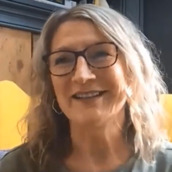Macmillan Support Line
How our support line can help you
"That phone call was like a huge, big hug down that line. I will never forget it... I will never be able to thank you enough. You gave me hope and you asked me what I needed." Quote from Melanie
Our trained advisers, including cancer information specialist nurses can provide emotional support and practical information about all aspects of cancer. If you have any questions or you just need someone to listen, get in touch.
You can ask us about:
- What happens next if you have just been diagnosed.
- What to expect from scans, tests and different treatments.
- Where to get support with money and work.
- Where to get help with how you are feeling, whether you have just been diagnosed or you have finished treatment.
- Getting practical and emotional help to support family or friends living with cancer.
Booklets and resources
How to contact a Macmillan adviser
Call free on 0808 808 00 00 to speak to an information and support adviser or cancer information nurse specialist. Available 7 days a week, 8am to 8pm.
Other ways to contact us- Chat online. Look for the 'chat to us' button on our website.
- Email us. Use our online form and we will respond within 2 working days.
- Request a callback: Leave your number and we will ring you back during opening hours
Our money advisers can help you access benefits and financial support you may be entitled to. Available Monday to Friday, 8am to 6pm.
How do I get support if the helpline is closed?
We know that there can be times that you might need information and support when the Macmillan Support Line is closed.
- You can request a call back during our opening hours and we will call you back during these times.
- Our Online Community forums are for people living with or affected by cancer to chat or ask questions. It is available 24 hours a day, 7 days a week.
- You can find lots of information written by our cancer information team on our website about diagnosis, treatments and the impacts of cancer.
What to do in an emergency
If you need emergency medical help you should talk to your doctor immediately, call 999 or go to your local hospital’s A&E department. They will understand and are trained to help.
You can also call Samaritans for free anytime on 116 123
Other ways we can help
If you need help in another language
If you need an interpreter
If you prefer to speak to us in another language, interpreters are available. Just state, in English, the language you want to use.
If you are deaf or hard of hearing
You can ask for a British Sign Language (BSL) interpreter call to be set up if you need further assistance. You can do this by emailing us or chatting with us to arrange a BSL interpreter call to be set up. Or you can have a hearing person you trust call the support line on your behalf.
Please note, it can take up to 3 working days to arrange a call. This depends on the availability of BSL interpreters and finding a time that suits you. You will need to have access to a laptop or PC, a good internet connection and a webcam.
For non-BSL users, you can chat online with cancer information specialists everyday, from 8am-8pm.
You can make text relay calls by dialling 18001 followed by 0808 808 0000. The Relay UK app is also available to download on Google Play or App Store.
-
Keeping people safeIt is important that the people who speak to us, and our colleagues on the Macmillan Support Line, feel safe. We have information about unacceptable behaviour when using the Macmillan Support Line.
-
Call recording and monitoring
Calls to our Macmillan Support Line are confidential, but may be monitored and recorded for quality and training purposes.
-
About our call charges
Calls to Macmillan's Support Line on 0808 808 00 00 are free on all UK landlines and UK mobile phones.
If you are calling from a business phone, you should check with your provider whether there will be a charge for calling numbers starting with 0800 or 0808.
-
If you are calling from outside the UK
If you're calling from outside of the UK you can contact us on +44 207 091 2230. We are unable to advise on healthcare systems overseas. Please note that calls to these numbers are not free when made from phones based outside the UK.
About our information
This information has been produced by Macmillan's Digital Content Editor team and reviewed by Macmillan's Direct Services team.
Learn more about how we produce our cancer information.



